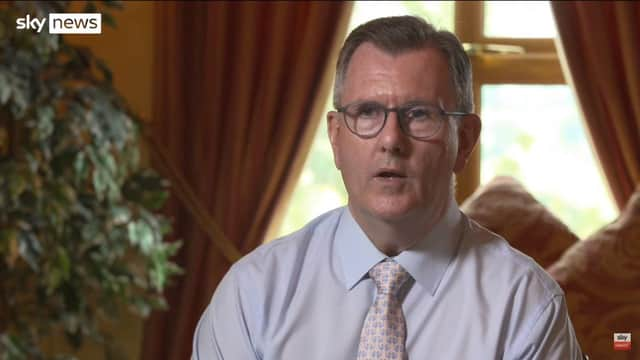Sir Jeffrey Donaldson says Troubles injustices need to be recognised


He was speaking following the collapse of high-profile legacy cases, and reports that the government will seek an amnesty for Troubles-era killings.
Sir Jeffrey said a system is needed which recognises the injustices that happened in the Troubles, to allow people to move on.
Advertisement
Hide AdAdvertisement
Hide AdHe told Sky News: “I think we need a process that moves us from where we are to where we can finally say, well, look, we’ve examined the past, we have given people the opportunity to explore whether there is the prospect of prosecutions against those who’ve murdered their loved ones.
“And then, yes, we need to move to the next phase of the peace process.
“We need to move our society beyond an examination of the past, to the kind of reconciliation and healing that we desire to see in Northern Ireland.
“So we need some form of process that recognises the suffering of many, the injustice that many feel in Northern Ireland.
Advertisement
Hide AdAdvertisement
Hide Ad“I don’t think you can pull a veil over that. I don’t think you could ignore that.
“I think that, if we’re going to have healing, we need to have recognition and acknowledgement.”
Justice Minister Naomi Long called for clarity from the government on proposals to introduce a stature of limitations on legacy killings.
She said: “It would be a de facto amnesty for everyone who committed those offences during the Troubles.
Advertisement
Hide AdAdvertisement
Hide Ad“It may be where the British government is taking the process, but it certainly isn’t where Alliance stands.
“We believe that it is right that, where the evidence is available and the prosecutorial test is met, that people should have access to justice.
“Because I firmly believe that, by denying people access to justice, we will create further grievance, further hurt, and further division in our community. I think that that’s a huge risk.
“I also don’t believe that it will be human rights compliant, because, under Article Two, I cannot see how, without the full consent of the entire community, you’re able to avoid the prosecutorial part of this process.”
Advertisement
Hide AdAdvertisement
Hide AdMrs Long also said it should not be taken as read that other prosecutions will fail because of the outcome in the Bloody Sunday cases.
She told BBC’s ‘Sunday Politics’: “We have always known that there will be a limited number of historic cases that will be able to be successfully prosecuted at this remove, due to the passing of witnesses, due to the processes of the time, and due to the lack of evidence.
“But that does not equate to justifying saying that no case, even where there are all of those things in place, should be able to make its way to the courts.
“That’s a fundamental difference that we need to bear in mind.
Advertisement
Hide AdAdvertisement
Hide Ad“Because if a family know that there is the evidence, the witnesses, and it makes the evidential threshold, to deny them the right to take their case to court, I think, would be entirely wrong.”
Mrs Long said the basis for forthcoming talks between the British and Irish governments on legacy issues is not clear.
“We need clarity on that,” she said. “We have already gone through this process and arrived at the Stormont House Agreement.”